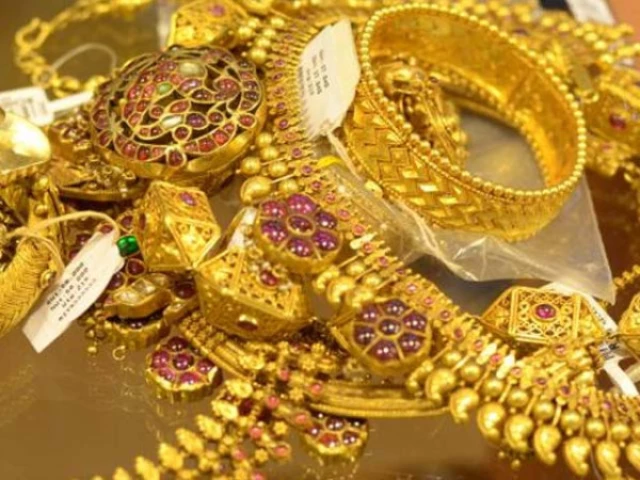Undocumented gold market to face scrutiny
Over 90% of metal is traded outside formal channels; dealers are not registered with SECP

Pakistan may come under the radar of the Financial Action Task Force (FATF) due to failure to regulate its gold market as 90% of the metal is still traded without formal channels.
Undocumented trade and the smuggling of gold dominate the Pakistani market. FATF had urged Islamabad to regulate its bullion market but the bulk of gold is traded outside of formal channels while the gold association sets prices, though no price mechanism exists.
A majority of gold dealers are not registered with the Securities and Exchange Commission of Pakistan (SECP). The Competition Commission of Pakistan (CCP) has highlighted the grey area in gold trade. It said that annual consumption of gold in Pakistan was estimated at 60 to 90 tons and proposed to the government to establish a separate authority to monitor and document bullion trade.
The CCP on Wednesday released its maiden Competition Assessment Study of the Gold Market in Pakistan, providing evidence-based analysis of the sector's structure, regulatory landscape and competitiveness challenges. The study, conducted by the CCP's Centre of Excellence in Competition Law, maps a market historically dominated by informality, fragmented oversight and pricing opacity.
According to the report, Pakistan's annual gold consumption ranges between 60 and 90 tonnes, driven largely by cultural demand, while over 90% of trading occurs outside of formal channels. The market relies almost entirely on imports, with $17 million worth of gold imported in financial year 2023-24. The study highlighted the transformative potential of Reko Diq copper and gold project, expected to generate up to $74 billion over its useful life of 37 years and significantly reshape domestic supply chains.
The report identified deep-rooted barriers that suppress competition and distort market functioning. There was dominance of the informal market as weak documentation and cash-based transactions allowed large informal networks to set prices and influence supply.
The CCP questioned the opaque price setting as daily gold rates are largely influenced by associations rather than transparent market mechanisms.
"Fragmented regulation also dominates. Overlapping and unclear mandates of the Ministry of Commerce, Federal Board of Revenue (FBR), State Bank, Pakistan Gems and Jewellery Development Company and Trade Development Authority of Pakistan create policy inconsistencies and enforcement gaps," it said. The report pointed to high taxes and compliance costs, saying that complex procedures and inconsistent taxation encourage smuggling and under-invoicing. Also, Pakistan has negligible refining capability and inadequate assaying and hallmarking facilities, leading to widespread purity issues and weak consumer protection.
The report noted data deficiencies including the absence of reliable import, trader registration, sales and purity data, which prevented evidence-based policymaking.
To address these challenges, the CCP proposed a reform package. It called for creating a unified regulator – the Pakistan Gold & Gemstone Authority – to harmonise rules, licensing, imports, and comply with anti-money laundering and countering of terrorism financing mechanisms.
It proposed mandatory assaying and hallmarking nationwide to ensure purity, protect consumers and enable exports. It stressed the need for digital transformation of the gold value chain with blockchain-based traceability integrated with the FBR's track & trace system.
The CCP called for establishing a gold banking system, based on the Turkiye model, to bring household gold to the formal sector. It urged the government to strengthen data governance through centralised reporting, market documentation and scientific price monitoring.
The CCP emphasised that modernising the gold sector would boost transparency, safeguard consumers, reduce illicit trade and unlock significant economic value, particularly as Pakistan prepares for commercial rollout of the Reko Diq project.




















COMMENTS (1)
Comments are moderated and generally will be posted if they are on-topic and not abusive.
For more information, please see our Comments FAQ